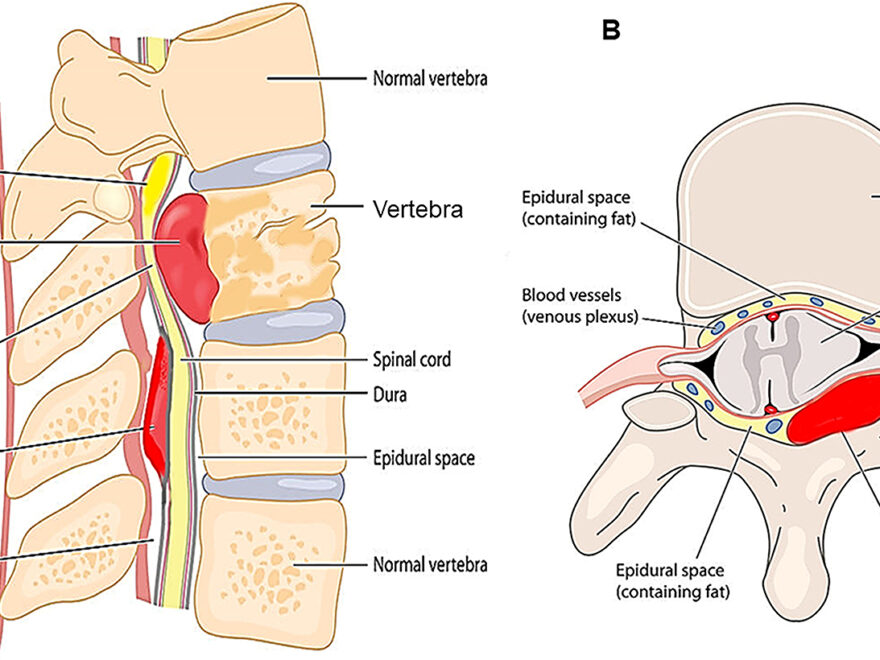Spinal Infection is the introduction of foreign infectious agents through the bloodstream into the spine. There is a rare occurrence of spinal Infection, which occurs when foreign contagious agents enter the spine through the bloodstream. Occasionally, infections can develop in the spinal bones, discs between the vertebrae (discs), the sheath enclosing the spinal cord, or the surrounding space of the spinal cord. Several bacteria and fungi may cause an infection. Spine infections may develop spontaneously in patients with certain risk factors or may result from previous spinal surgeries. Several factors, including poor nutrition, immune system disorders, HIV infection, cancer, diabetes, and obesity, among others, cause infection. So it is always advisable to consult a pain medicine clinic, he will guide you best to get rid of this condition after proper diagnosis.
What Causes Spinal Infections?
Spinal Infection may arise due to any bacterial or viral attack on any body system. Generally, the most common causes of spinal infections include staphylococcus aureus and E. coli. Other causes of spinal infections include:
Dental Procedures
Some bacteria may enter during dental procedures and travel towards the spine through the stream, affecting spine functions.
Intravenous Drug Abusers
Individuals who are intravenous drug abusers get caught by spinal infections due to cervical weakening.
Urological Procedures
As the veins traveling towards the lower spine pass through the pelvic area. So, the urological procedures may be an underlying cause behind spinal infections.
Medical Devices
If the medical devices used during surgical procedures are not sterilized properly, they may cause any bacterial or viral infection that enters the bloodstream.
Any incident that causes the bacteria or virus to enter the body and weaken the immune system may lead to spinal infections. It also includes administering drugs like immunosuppressants prescribed for specific medical treatments.
Risk Factors of Spinal Infection
Those risk factors that can compromise the immune system and lead to spinal infection are:
- Diabetes Mellitus
- Cancer
- Intravenous Drugs
- Organ transplantation
- Age factor
- Malnutrition
- Human immunodeficiency virus
For repetitive surgical procedures, almost 1-4% of them have a higher risk for spinal infections.
Symptoms of Spinal Infections
Symptoms of spinal Infection may appear gradually in a localized area. There is pain in the spinal bone, along with fever and chills. Other associated symptoms include
- Redness and Inflammation near incision
- Muscle spasms
- Wound drainage
- Weight loss
- Numbness in arms and legs
- Uneasiness while urination
- Neurological deficits
Types of Spinal Infections
Spinal infections may be of several types. The main types involve the following
-
Discitis
If the Inflammation occurs in the intervertebral discs, it is known as discitis. It is an uncommon type that may appear after surgeries. According to a few healthcare experts, discitis and osteomyelitis belong to the same category of infections. Mainly, two bacteria, staphylococcus aureus and streptococcus, are involved in spreading discitis. It causes pain that radiates towards the limbs.
-
Meningitis
Inflammation in the spine and brain tissues. Meningitis is a very severe type of spinal Infection. A reaction to any drug, Infection or viral disorder can cause it. Symptoms of meningitis resemble that of a viral infection, including neck stiffness and fever. If brain cells are also affected, they may lead to seizures or neurological disorders.
Other types of spinal infections may include vertebral osteomyelitis, spinal epidural abscess, spinal cord abscess and spinal subdural empyema.
How Can Spinal Infections Be Diagnosed?
Early diagnosis facilitates the onset of treatment procedures and effective outcomes. Typically, it can take a complete month to find the natural causes. However, specific diagnostic approaches may include the following
- Laboratory Tests
- Erythrocyte sedimentation rate tests
- C-reactive protein levels
- Computer Tomography led to biopsy
- Imaging Tests
- Magnetic Resonance Imaging
Treatment of Spinal Infections
Spinal infections require long-term treatments until the patient is mentally and physically stable. Surgical treatments are always the first choice of treatment until there is sepsis or surgical bone destruction. Failure of antibiotics or needle biopsy may also demand surgical treatments.
However, the main focus is to restore spinal stability and functions through increased blood flow and cleaning affected tissues.
Non-surgical treatments may include antimicrobial therapy along with other antibiotics and antifungals. Experts at the pain clinic Fort Worth may plan a customized plan according to individual patients’ needs and therapy goals.
What are the Long-term Effects?
Repeated operations in the same area may also increase the risk. Especially when the Infection is severe and widespread, long-lasting treatment may be required. Following surgery in a hospital, a long period of antibiotic treatment is continued through the veins or mouth. After your doctor has controlled your white blood cell count, CRP levels, and sedimentation rates, your treatment will be ended once your symptoms have resolved and your blood values have normalized.
Facts
- It is also known that patients in developing countries are at risk of contracting brucella infections if they consume unpasteurized milk or dairy products.
- The risks associated with surgery include the length of surgery, the use of instrumentation, and the need for revisions.
- Despite all precautions, infection rates may rise to 4 per cent in hospitals with optimum conditions, particularly when instrumentation is used.
- Surgery infections most frequently occur within three days to three months following surgery, mainly when repeated operations are carried out in the same area.

